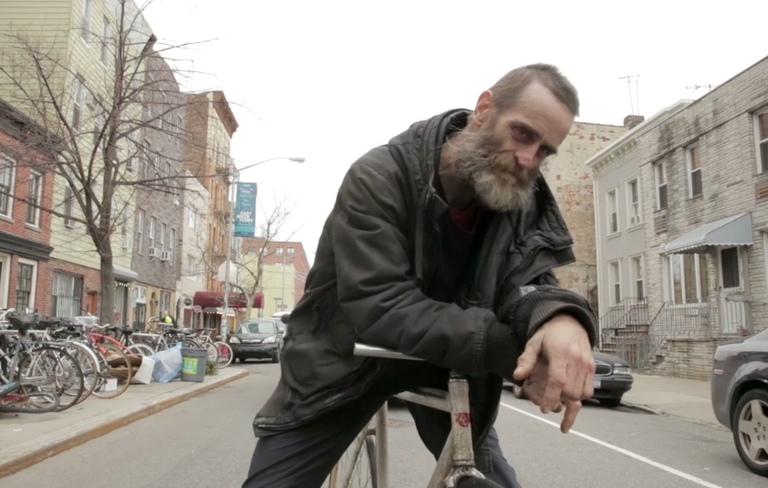Bicycling, November 2018
After Losing One of Their Own, Bike Delivery Workers Fight for Health Care
MOST OF THE CYCLISTS WHO DELIVER OUR FOOD DON’T HAVE HEALTH INSURANCE. SOME RIDERS WANT TO CHANGE THAT.
In 2015, Bill Meier, a 50-year-old bike deliverer in Brooklyn, New York, died from complications related to a perforated ulcer. Meier was a fixture in the local cycling scene, and his passing earned him tributes on food websites like Eater and Munchies, with one writer calling him “Williamsburg’s favorite bearded pizza delivery man.” He had been working for a pizzeria in the popular Brooklyn neighborhood when he fell ill, was hospitalized, and died about a month later.
Mick Wiegand, a friend and former coworker, recalled talking with Meier about his health problems. An ulcer isn’t usually life-threatening if properly treated. But Wiegand said Meier, who was uninsured, had told him that he would avoid going to the doctor, even when he wasn’t feeling well—because he couldn’t afford the visit, and because of the financial hit he would take from missing work.
Meier’s death underscored a longstanding problem in commercial cycling: Most of the riders who deliver our food or transport our documents don’t have health insurance through their employers. While hard numbers are difficult to come by, a 2002 paper on bike messengers in Boston found that only 32 percent of those surveyed had health insurance. Few messengers and delivery people are full-time employees at all, with the rest classified as independent contractors who work long hours for tips to survive.
Yet even the fastest riders often can’t make enough to cover ongoing health issues without insurance, much less medical emergencies. Despite expanded access to health insurance under the Affordable Care Act, independent contractors still have trouble finding good, comprehensive coverage without breaking the bank.
The U.S. Bureau of Labor Statistics pegged the average annual wage for bike messengers in the New York metro area at around $33,000, an income that allows for a subsidy of about $270 on the state’s health insurance marketplace. But even with that help, it would mean paying more than $200 a month out of pocket for a plan with a $2,000-plus deductible, making the insurance functionally worthless for preventative care.
Wiegand said that for bike deliverers, “it’s always in the back of your mind” that you could get hurt on the job. If the worst happens, you might not be able to afford medical care, especially if the injury renders you unable to work.
Do Lee, a visiting lecturer and graduate advisor in urban studies at Queens College, studied bike delivery workers for his Ph.D. dissertation. Lee said his research has shown that it’s not just the one big crash that can hurt working cyclists. In surveying 200 delivery riders, he found the “great majority” didn’t get health insurance through their employers, while one-third worked through pain multiple days a week.
In addition, almost half the delivery people Lee surveyed said their employers didn’t offer workers’ compensation, in an industry where even a good day can take an enormous physical toll on riders. Those riders also told Lee they had to pay for medical coverage out of pocket.
“Because of the accumulated physical toll and injuries on the job, delivery workers reported annual lost-injury rates 22-49 times higher than the national average,” Lee said. (Lost-injury rates refer to instances where injuries cause missed time at work.)
All of this makes for a system that grinds up working cyclists, but it doesn’t have to be this way. Some bike workers point to Europe as an example of how universal health care makes it easier and cheaper for delivery riders to take care of themselves.
“We definitely are familiar with our European colleagues and the health care access that they enjoy, and it’s a night-and-day difference,” Horse said. “They’re definitely healthier for it. They have less stigma about going to the doctor in the first place... Bill’s not the only one we’ve lost because of this lack of health care access.”
Horse said he’s seen and donated to enough GoFundMe campaigns for coworkers trying to cover medical costs—a distressingly common tactic in the U.S.—to know that American bike workers need coverage.
Meier had a sterling reputation among working cyclists in New York. Wiegand, who met Meier when he first moved to the city and got a job delivering for a late-night cookie spot, said there was no one friendlier from whom he could learn the craft.
“You couldn’t ask for a better guide for riding in the city,” Wiegand said, recalling how Meier helped him avoid “rookie mistakes” and taught him how to take care of his bike on New York’s pockmarked streets. “[Bill] was always really positive, he was friendly with everyone. Even if he couldn’t remember your name, he’d remember your face and be just as friendly. He was sort of a legend. He was one of those oldhead messengers who’d been doing it forever, and knew everything there was to know about that scene.”
Horse put it bluntly: “The community was [Bill’s] life. He’d been a messenger for as long as I’d been alive.”
A small group of bike workers still had Meier on their minds this past June, three years after his death, when they honored his memory by ghost riding his bike from New York City to Albany. The ride, which Horse said covered about 160 miles and took two days, was done in support of the New York Health Act, a bill that would establish single-payer health care in New York State. It’s the same kind of class consciousness behind efforts to organize and unionize the bike delivery industry, which has traditionally run with a kind of Wild West, every-man-for-himself mentality.
The ride was documented in a short video by filmmaker Sara Kinney (which also included footage from “Delivery,” a previous short film on Meier by the production company No Weather). Horse narrated, telling viewers about both Meier’s life in New York and the political fight for health care among bike workers. In a dramatic flourish, Horse pulled up with Meier’s bike in the middle of a pro-Health Act rally in front of the New York State Capitol:
Having passed the state Assembly in each of the last four years, the New York Health Act picked up momentum recently as activists have tried to push the bill through the state Senate, where the Democratic Party just won a majority in the midterm elections. Horse organized the ride not only to honor Meier, but also to advocate for a policy that aims to help others in similar circumstances.
“I was motivated with the New York Health Act because it’s something that could pass if the Senate gets flipped,” Horse said in July, before Democrats won the chamber. “That struck me as something that’s possible, that’s tangible, and there’s a political climate and opportunity for that to happen.”
A study this year by the RAND Corporation put the issue’s cost and feasibility in the spotlight, concluding that while there are challenges down the road, universal coverage through the state would save New York $15 billion by 2031. While Democratic control of the state Senate won’t guarantee the Health Act’s passage—Governor Andrew Cuomo, for instance, has signaled his opposition—it does bring the bill one step closer to fruition. Even if it’s too late for Meier.
“It’s the fault of our health care system that we don’t have Bill with us today,” Horse said. “That’s disturbing for me.”

